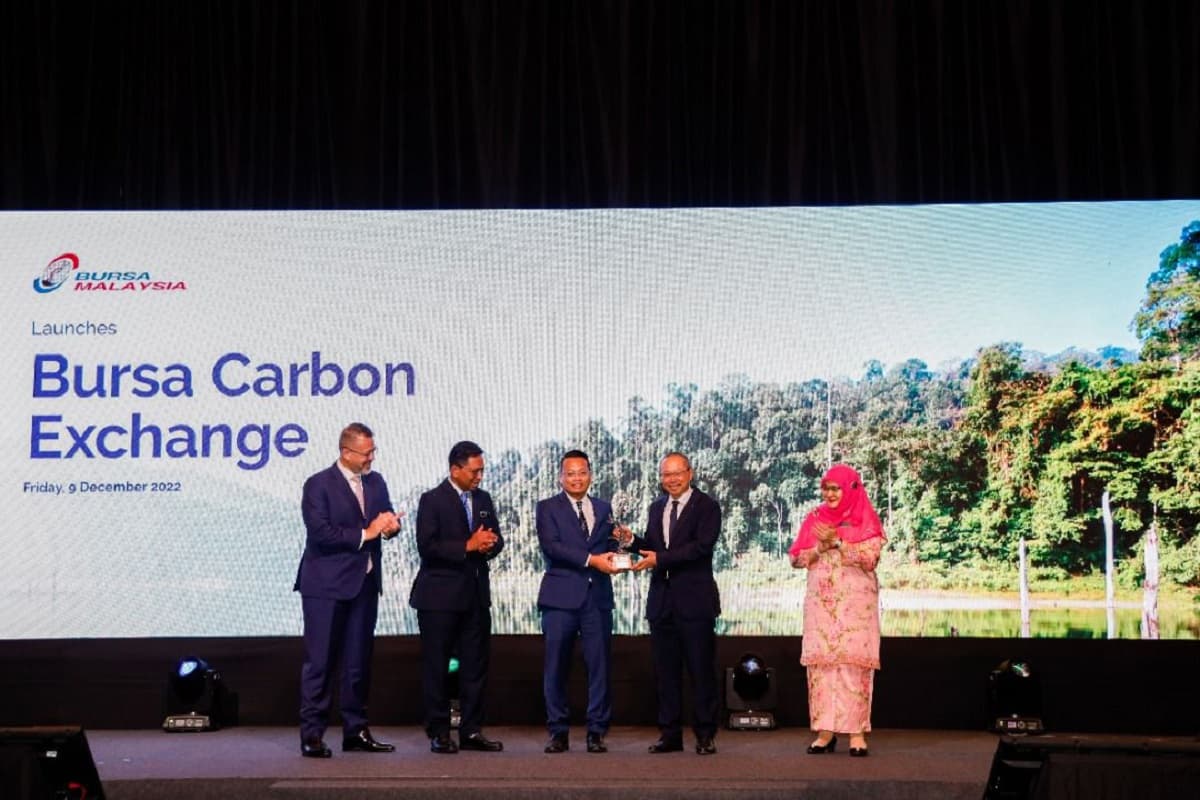
KUALA LUMPUR (Dec 9): Bursa Malaysia Bhd on Friday (Dec 9) launched the Bursa Carbon Exchange (BCX), which is a voluntary carbon market (VCM) and the world’s first shariah-compliant carbon exchange. The first trade via auction on the BCX is expected to commence in March 2023.
The BCX enables companies and other entities to trade voluntary carbon credits from projects that remove, reduce or avoid greenhouse gas (GHG) emissions, so that they can meet their climate targets. The VCM is a joint initiative between the Ministry of Environment and Water (under the former government) and Ministry of Finance, and was first announced over a year ago. Bursa is tasked with operating the VCM.
“We hope that it can contribute to our [Malaysia’s] ambition to achieve our target of net zero GHG emissions by 2050, and assist Corporate Malaysia’s pivot towards a green economy and meet global standards for a sustainable supply chain. I believe if we do not embark on this path, it will greatly affect our businesses when they compete in the international market,” said newly appointed Natural Resources, Environment and Climate Change Minister Nik Nazmi Nik Ahmad.
Carbon credits can be generated from nature-based solutions, such as reforestation and afforestation projects. It can also be generated from technology-based solutions like methane capture for waste management and biogas.
There will be no restrictions imposed on sales of carbon credits generated from Malaysian projects to foreign buyers, said Nik Nazmi. Additionally, the Malaysian credits traded on the BCX cannot be used by other countries to meet their climate targets or nationally-determined contributions (NDCs). Therefore, it will not affect Malaysia’s GHG calculations for its own NDCs.
“I am looking forward, via my ministry, to organise listening and engagement sessions to align the carbon-related policies between the federal and state governments. It is my earnest desire for us to collectively facilitate the development of a vibrant VCM ecosystem with the private sector,” said Nik Nazmi in his keynote address.
He also noted that the incorporation of the energy and natural resources sectors into the new ministry will allow climate change planning to be better coordinated. The new minister will be tabling the fourth biennial update report to the Cabinet this month, which has information on the latest GHG emissions in Malaysia. This has to be submitted to the United Nations (UN) by the end of December.
The VCM is crucial to accelerate the transition to a low-carbon economy and limit global warming to below 1.5°C, said Tan Sri Abdul Wahid Omar, the chairman of Bursa, in his welcome remarks.
Abdul Wahid urged corporates in hard-to-abate sectors to prioritise the purchase of carbon credits to combat climate change, rather than buying it as a last resort to close their emissions target gap.
“In this regard, while developing their mitigation strategy, corporates are urged to contribute to the financing of other decarbonising projects, as the planet cannot wait until 2030, 2040 or 2050 for corporates to invest in carbon credits. Carbon offset projects, particularly those based on nature, have a long gestation period and necessitate early funding to meet long-term emissions reduction goals,” said Abdul Wahid.
Under the BCX rules, buyers and sellers are incorporated entities, which could be foreign entities or companies incorporated in Malaysia. This could be commodity traders, financial institutions, brokers, project developers or corporates.
Companies that purchase the credits could choose to retire it to offset their own carbon footprint, or sell the standardised contracts with underlying carbon credits through the BCX’s trading platform. They could also keep it in their BCX trading accounts for future use.
Nature-based and tech-based carbon credit projects can be considered for the BCX, but the vintage must be from 2016 onwards. The projects must also be registered with the Verified Carbon Standard (Verra). Verra is a widely recognised standard in the voluntary carbon market, and accounts for nearly 70% of voluntary carbon credit issuances globally.
Given the lack of active Verra-registered carbon credit projects in Malaysia currently, the first auction will source credits generated from abroad, said Datuk Muhamad Umar Swift, the chief executive officer of Bursa.
“We hope that will spur local developers and project owners to bring their products to market,” he said.
Muhamad Umar hopes that the BCX will incentivise buyers and sellers of carbon credits in Malaysia to invest and finance climate-friendly projects.
“Corporate buyers will be able to purchase high-quality carbon credits from the BCX to offset their emissions, demonstrating progress in their voluntary climate commitments while creating carbon-neutral products. At the national level, more local carbon credit projects will lead to higher GHG emissions reduction or removal, directly improving Malaysia’s ability to meet its net zero aspirations and contribute to the Paris Agreement,” said Muhamad Umar.
The BCX will provide three modes of carbon trading: auction, spot trading for standardised contracts of carbon credits and spot trading services for off-market transactions. Standardised contracts refer to a collection of carbon credits that could have shared attributes, like project type, which could be nature-based solutions, geography or standards.
Projects registered under the Clean Development Mechanism (CDM), which is a UN carbon offset scheme under the Kyoto Protocol in 2006, can supply standardised carbon contracts for the BCX as well. But the project developers have to convert their issued certified emissions reductions (credits generated from a CDM project) to verified carbon units in Verra’s registry, and the vintage has to be from 2016 onwards.